知足常乐英语演讲稿
- 格式:docx
- 大小:16.47 KB
- 文档页数:3
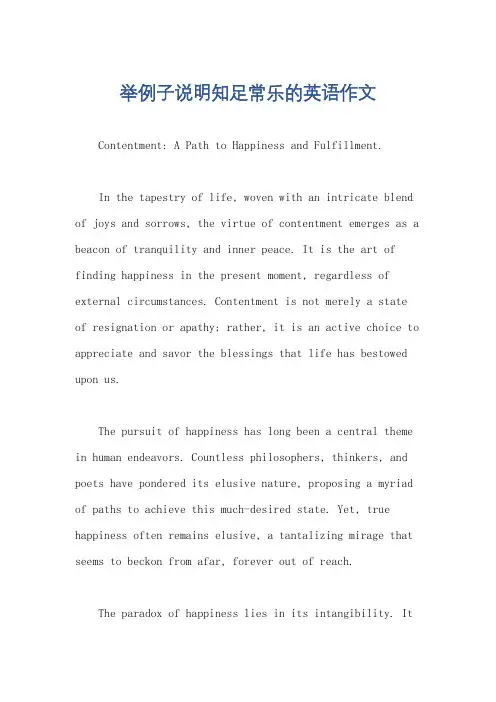
举例子说明知足常乐的英语作文Contentment: A Path to Happiness and Fulfillment.In the tapestry of life, woven with an intricate blend of joys and sorrows, the virtue of contentment emerges as a beacon of tranquility and inner peace. It is the art of finding happiness in the present moment, regardless of external circumstances. Contentment is not merely a state of resignation or apathy; rather, it is an active choice to appreciate and savor the blessings that life has bestowed upon us.The pursuit of happiness has long been a central theme in human endeavors. Countless philosophers, thinkers, and poets have pondered its elusive nature, proposing a myriad of paths to achieve this much-desired state. Yet, true happiness often remains elusive, a tantalizing mirage that seems to beckon from afar, forever out of reach.The paradox of happiness lies in its intangibility. Itcannot be bought, bartered, or forcibly obtained. True happiness is an ephemeral flower that blossoms only in the fertile soil of contentment. By cultivating a mindset of gratitude and acceptance, we can nurture its delicate petals and allow its fragrance to permeate our lives.The benefits of contentment are manifold. Studies have shown that content people experience lower levels of stress and anxiety, have stronger immune systems, and enjoy better sleep. They are less likely to engage in unhealthy behaviors such as excessive substance use or gambling, and they tend to have more positive relationships with others. Contentment is, therefore, not only a desirable state inits own right but also a gateway to a healthier and more fulfilling life.However, cultivating contentment is not always an easy task. In a world that constantly bombards us with messages of inadequacy and the need for more, it can be challenging to resist the allure of material possessions and external validation. The key is to remember that true contentment comes from within. It is not dependent on our circumstancesbut on our perspective.One way to cultivate contentment is to practice gratitude. Take time each day to reflect on the things you are grateful for, both big and small. Savor the simple pleasures in life, such as a warm cup of coffee, a beautiful sunset, or the laughter of a child. By focusing on the positive aspects of our lives, we can shift our perspective and become more appreciative of what we have.Another key to contentment is to set realistic expectations. We all have hopes and dreams, but it is important to remember that life is not always fair. There will be setbacks and disappointments along the way. Rather than dwelling on these challenges, we can learn to accept them as part of life's journey. By embracing the present moment and letting go of unrealistic expectations, we can find contentment even in the face of adversity.It is also important to surround ourselves with positive influences. People who are content with their lives tend to be surrounded by others who share theiroutlook. Seek out the company of those who inspire you, support you, and make you feel good about yourself. Avoid people who are constantly complaining or negative, as they can drag you down and make it harder to cultivate contentment.Finally, remember that contentment is a journey, not a destination. It is a daily practice that requires effortand attention. There will be times when you feel more content than others, but the key is to keep striving for it. By cultivating a mindset of gratitude, acceptance, and realistic expectations, you can transform your life and experience the profound benefits of contentment.In the words of the ancient Greek philosopher Epictetus, "He is a wise man who does not grieve for the things which he has not, but rejoices for those which he has." May weall find the wisdom to embrace this truth and live lives filled with contentment and fulfillment.。
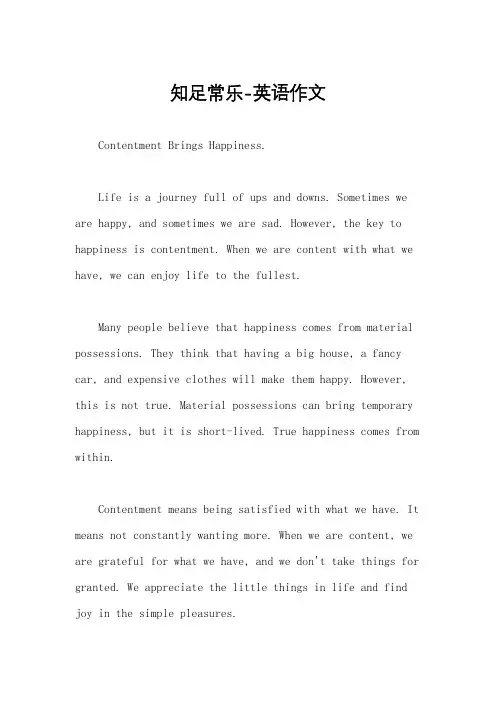
知足常乐-英语作文Contentment Brings Happiness.Life is a journey full of ups and downs. Sometimes we are happy, and sometimes we are sad. However, the key to happiness is contentment. When we are content with what we have, we can enjoy life to the fullest.Many people believe that happiness comes from material possessions. They think that having a big house, a fancy car, and expensive clothes will make them happy. However, this is not true. Material possessions can bring temporary happiness, but it is short-lived. True happiness comes from within.Contentment means being satisfied with what we have. It means not constantly wanting more. When we are content, we are grateful for what we have, and we don't take things for granted. We appreciate the little things in life and find joy in the simple pleasures.People who are content are happier and more fulfilled. They don't measure their worth by their possessions or status. They are comfortable in their own skin and don't feel the need to impress others. They live in the present moment and enjoy life as it comes.In conclusion, contentment brings happiness. When we are content, we are happy with what we have, and we don't need more to be happy. We appreciate the little things in life and find joy in the simple pleasures. So, let us all strive to be content and enjoy life to the fullest.。
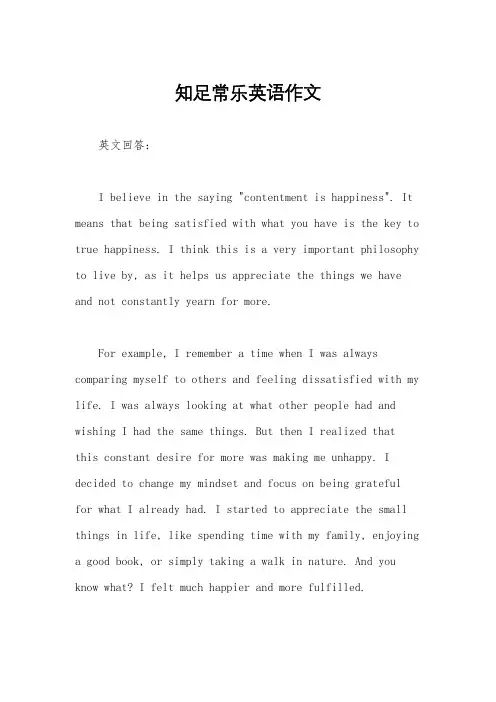
知足常乐英语作文英文回答:I believe in the saying "contentment is happiness". It means that being satisfied with what you have is the key to true happiness. I think this is a very important philosophy to live by, as it helps us appreciate the things we have and not constantly yearn for more.For example, I remember a time when I was always comparing myself to others and feeling dissatisfied with my life. I was always looking at what other people had and wishing I had the same things. But then I realized thatthis constant desire for more was making me unhappy. I decided to change my mindset and focus on being gratefulfor what I already had. I started to appreciate the small things in life, like spending time with my family, enjoying a good book, or simply taking a walk in nature. And you know what? I felt much happier and more fulfilled.中文回答:我相信“知足常乐”这句话。
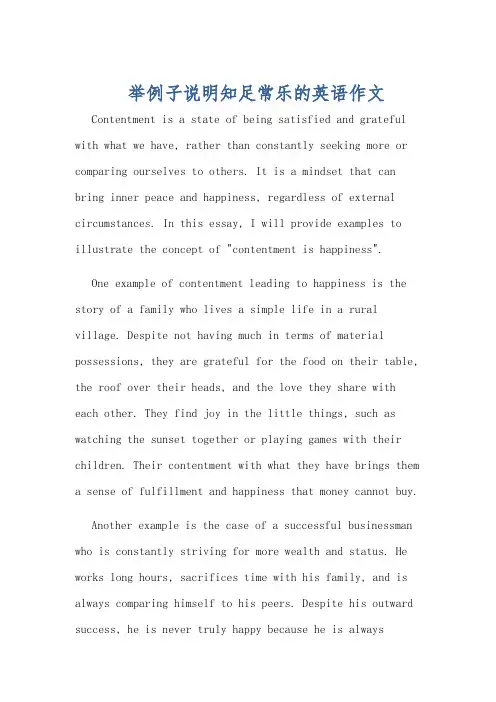
举例子说明知足常乐的英语作文Contentment is a state of being satisfied and grateful with what we have, rather than constantly seeking more or comparing ourselves to others. It is a mindset that can bring inner peace and happiness, regardless of external circumstances. In this essay, I will provide examples to illustrate the concept of "contentment is happiness".One example of contentment leading to happiness is the story of a family who lives a simple life in a rural village. Despite not having much in terms of material possessions, they are grateful for the food on their table, the roof over their heads, and the love they share with each other. They find joy in the little things, such as watching the sunset together or playing games with their children. Their contentment with what they have brings them a sense of fulfillment and happiness that money cannot buy.Another example is the case of a successful businessman who is constantly striving for more wealth and status. He works long hours, sacrifices time with his family, and is always comparing himself to his peers. Despite his outward success, he is never truly happy because he is alwayschasing after the next big thing. In contrast, a colleague of his who is content with his modest lifestyle and focuses on building meaningful relationships is much happier and more fulfilled.In both of these examples, we can see that contentment leads to happiness by shifting our focus from what we lack to what we already have. When we learn to appreciate and be grateful for the blessings in our lives, we can experience true joy and peace. Contentment allows us to live in the present moment, rather than constantly worrying about the future or dwelling on the past.In conclusion, cultivating a mindset of contentment can bring us lasting happiness and fulfillment. By being grateful for the simple things in life and letting go of the need for more, we can find true joy and peace within ourselves. As the saying goes, "Happiness is not having what you want, but wanting what you have." Let us strive to practice contentment in our daily lives and appreciate the abundance that surrounds us.知足常乐是一种满足和感恩的状态,而不是不断追求更多或与他人比较。
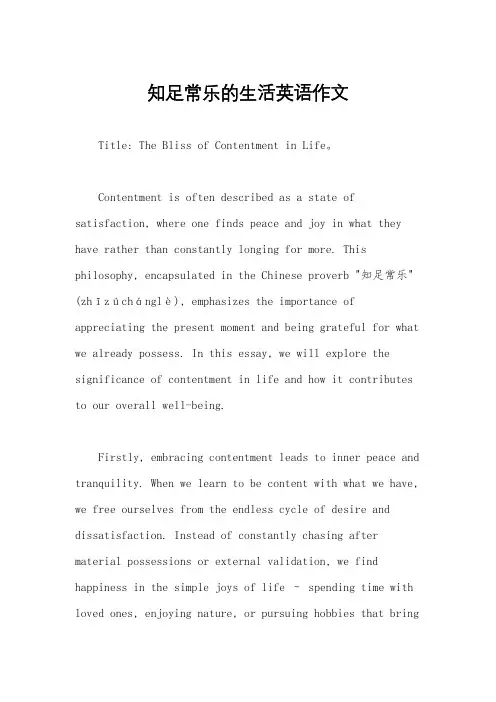
知足常乐的生活英语作文Title: The Bliss of Contentment in Life。
Contentment is often described as a state of satisfaction, where one finds peace and joy in what they have rather than constantly longing for more. This philosophy, encapsulated in the Chinese proverb "知足常乐" (zhīzúchánglè), emphasizes the importance of appreciating the present moment and being grateful for what we already possess. In this essay, we will explore the significance of contentment in life and how it contributes to our overall well-being.Firstly, embracing contentment leads to inner peace and tranquility. When we learn to be content with what we have, we free ourselves from the endless cycle of desire and dissatisfaction. Instead of constantly chasing after material possessions or external validation, we find happiness in the simple joys of life – spending time with loved ones, enjoying nature, or pursuing hobbies that bringus fulfillment. This inner peace allows us to cultivate a sense of harmony with ourselves and the world around us, fostering a positive outlook on life.Moreover, practicing contentment promotes gratitude and appreciation. By acknowledging the abundance already present in our lives, we develop a greater sense of gratitude for the blessings, both big and small. Whetherit's a roof over our heads, food on the table, or the companionship of friends, we learn to recognize and cherish the things that truly matter. Cultivating an attitude of gratitude not only enhances our overall happiness but also strengthens our relationships and fosters a sense of interconnectedness with others.Furthermore, living a life of contentment encourages mindfulness and presence. Instead of dwelling on past regrets or worrying about the future, we learn to fully engage with the present moment. Mindfulness allows us to savor life's experiences more deeply, whether it'srelishing the taste of a delicious meal, appreciating the beauty of a sunset, or simply being fully present with thepeople we care about. By cultivating awareness and acceptance of the present moment, we can find joy and fulfillment in the here and now.Additionally, contentment promotes resilience and emotional well-being. When we are content with what we have, we are less susceptible to the ups and downs of external circumstances. Rather than allowing setbacks or disappointments to overshadow our happiness, we maintain a sense of inner strength and resilience. This resilience enables us to navigate life's challenges with grace and optimism, bouncing back from adversity with a renewed sense of purpose and determination.In conclusion, embracing contentment is essential for leading a fulfilling and meaningful life. By learning to appreciate the present moment, cultivate gratitude, and foster inner peace, we can experience greater happiness and well-being. Let us strive to embody the spirit of "知足常乐" and find joy in the simple pleasures of life, for true happiness lies not in what we acquire, but in the contentment of the heart.。
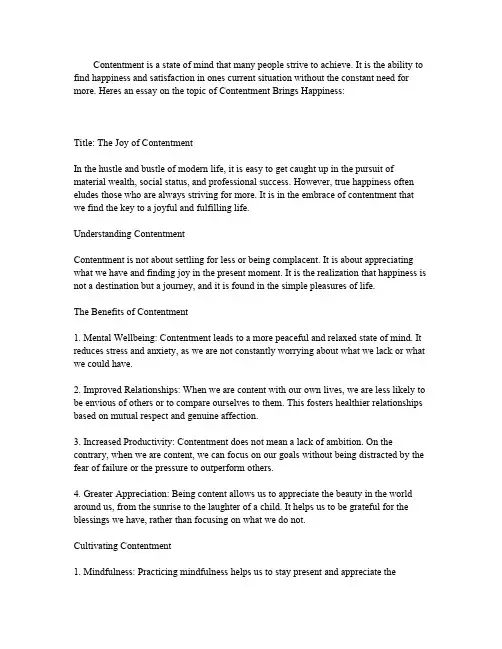
Contentment is a state of mind that many people strive to achieve.It is the ability to find happiness and satisfaction in ones current situation without the constant need for more.Heres an essay on the topic of Contentment Brings Happiness:Title:The Joy of ContentmentIn the hustle and bustle of modern life,it is easy to get caught up in the pursuit of material wealth,social status,and professional success.However,true happiness often eludes those who are always striving for more.It is in the embrace of contentment that we find the key to a joyful and fulfilling life.Understanding ContentmentContentment is not about settling for less or being complacent.It is about appreciating what we have and finding joy in the present moment.It is the realization that happiness is not a destination but a journey,and it is found in the simple pleasures of life.The Benefits of Contentment1.Mental Wellbeing:Contentment leads to a more peaceful and relaxed state of mind.It reduces stress and anxiety,as we are not constantly worrying about what we lack or what we could have.2.Improved Relationships:When we are content with our own lives,we are less likely to be envious of others or to compare ourselves to them.This fosters healthier relationships based on mutual respect and genuine affection.3.Increased Productivity:Contentment does not mean a lack of ambition.On the contrary,when we are content,we can focus on our goals without being distracted by the fear of failure or the pressure to outperform others.4.Greater Appreciation:Being content allows us to appreciate the beauty in the world around us,from the sunrise to the laughter of a child.It helps us to be grateful for the blessings we have,rather than focusing on what we do not.Cultivating Contentment1.Mindfulness:Practicing mindfulness helps us to stay present and appreciate themoment,rather than constantly looking to the future or dwelling on the past.2.Gratitude:Regularly expressing gratitude for what we have can shift our focus from what we lack to what we have,fostering a sense of contentment.3.Setting Realistic Expectations:Understanding that life is imperfect and setting achievable goals can help us to be content with our progress and achievements.4.Limiting Material Desires:Recognizing that material possessions do not bring lasting happiness can help us to find contentment in nonmaterial aspects of life. ConclusionIn a world that often promotes the idea that more is better,embracing contentment can be a revolutionary act.It is a choice to find joy in the simple things and to be at peace with where we are in life.By cultivating contentment,we open ourselves up to a deeper and more enduring form of happiness that is not dependent on external circumstances.This essay explores the concept of contentment and its role in achieving happiness.It discusses the benefits of being content and offers practical advice on how to cultivate this mindset.。
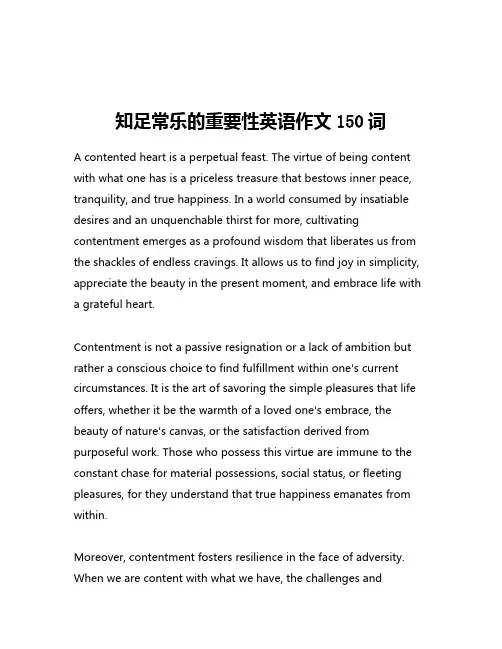
知足常乐的重要性英语作文150词A contented heart is a perpetual feast. The virtue of being content with what one has is a priceless treasure that bestows inner peace, tranquility, and true happiness. In a world consumed by insatiable desires and an unquenchable thirst for more, cultivating contentment emerges as a profound wisdom that liberates us from the shackles of endless cravings. It allows us to find joy in simplicity, appreciate the beauty in the present moment, and embrace life with a grateful heart.Contentment is not a passive resignation or a lack of ambition but rather a conscious choice to find fulfillment within one's current circumstances. It is the art of savoring the simple pleasures that life offers, whether it be the warmth of a loved one's embrace, the beauty of nature's canvas, or the satisfaction derived from purposeful work. Those who possess this virtue are immune to the constant chase for material possessions, social status, or fleeting pleasures, for they understand that true happiness emanates from within.Moreover, contentment fosters resilience in the face of adversity. When we are content with what we have, the challenges andsetbacks that life inevitably presents become less daunting. We are better equipped to weather storms with equanimity, accepting circumstances beyond our control while focusing our energy on what we can influence. This mindset prevents us from becoming mired in negativity, bitterness, or envy, preserving our mental well-being and emotional equilibrium.Ultimately, the pursuit of contentment is not a destination but a journey – a continuous practice of gratitude, mindfulness, and self-reflection. It is a conscious decision to savor the present moment, embrace life's simple joys, and find fulfillment in the here and now. By nurturing this virtue, we unlock the secret to lasting happiness, inner peace, and a life well-lived, free from the relentless pursuit of more.。

In the bustling world we live in, where the pursuit of success and material wealth seems to be the ultimate goal, its easy to overlook the simple pleasures in life. However, Ive come to realize that contentment is a state of mind that can lead to true happiness. This realization was not an overnight epiphany but a journey of selfdiscovery and reflection.Growing up, I was always surrounded by the idea that more is better. Whether it was better grades, more friends, or the latest gadgets, the message was clear: to be happy, you need to have more. This mindset led me to constantly compare myself with others and strive for things that I thought would bring me happiness. But as time went on, I found myself feeling increasingly empty and unsatisfied.It was during a family trip to a small village that my perspective began to change. We were there to visit my grandparents who lived a simple life, far removed from the hustle and bustle of the city. What struck me the most was their contentment and joy, despite having very little in terms of material possessions. They had a small house, a garden, and a few animals, but they were always smiling and seemed genuinely happy.I remember asking my grandmother about the secret to her happiness. She simply replied, Contentment comes from within, not from what you have. Her words resonated with me, and I began to question my own definition of happiness.Back home, I started to pay more attention to the little things in life. I found joy in the warmth of the sun on my face, the laughter of my friends,and the taste of my mothers homemade cookies. I realized that these simple pleasures were just as fulfilling, if not more so, than the material things I had been chasing.However, the journey to contentment was not without its challenges. There were times when I felt the urge to compare myself with others or felt envious of their achievements. But I reminded myself of my grandmothers words and focused on what I had, rather than what I lacked.One of the most significant changes I made was to practice gratitude daily.I started to keep a gratitude journal, where I would write down at least three things I was grateful for each day. This simple act helped me to shift my focus from what I wanted to what I already had. It also made me appreciate the people and experiences in my life.Another way I cultivated contentment was by setting realistic expectations for myself. Instead of constantly striving for perfection, I learned to accept my flaws and limitations. I realized that its okay not to be the best at everything and that my worth is not determined by my achievements.Moreover, I made a conscious effort to spend time with people who were positive and supportive. Surrounding myself with individuals who valued happiness over material success helped me to stay grounded and maintain a healthy perspective.In conclusion, the journey to contentment is a personal one that requires selfawareness, gratitude, and a shift in perspective. Its not about havingmore but appreciating what you already have. By focusing on the simple pleasures in life and cultivating a grateful heart, we can find true happiness that is not dependent on external factors. So, the next time you find yourself longing for more, remember that contentment is a choice, and happiness is just a mindset away.。
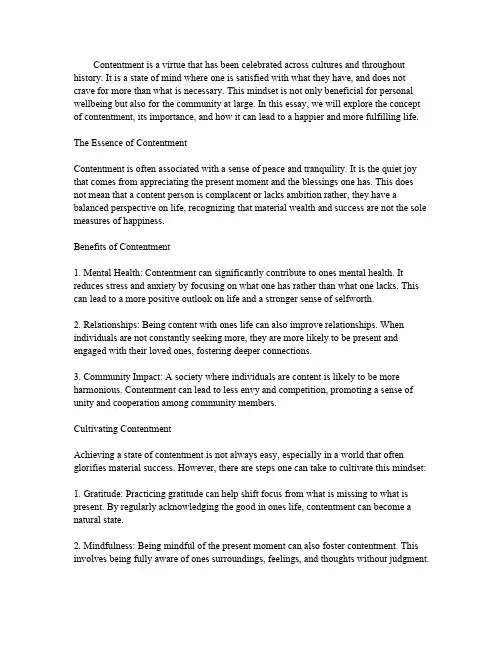
Contentment is a virtue that has been celebrated across cultures and throughout history.It is a state of mind where one is satisfied with what they have,and does not crave for more than what is necessary.This mindset is not only beneficial for personal wellbeing but also for the community at large.In this essay,we will explore the concept of contentment,its importance,and how it can lead to a happier and more fulfilling life.The Essence of ContentmentContentment is often associated with a sense of peace and tranquility.It is the quiet joy that comes from appreciating the present moment and the blessings one has.This does not mean that a content person is complacent or lacks ambition rather,they have a balanced perspective on life,recognizing that material wealth and success are not the sole measures of happiness.Benefits of Contentment1.Mental Health:Contentment can significantly contribute to ones mental health.It reduces stress and anxiety by focusing on what one has rather than what one lacks.This can lead to a more positive outlook on life and a stronger sense of selfworth.2.Relationships:Being content with ones life can also improve relationships.When individuals are not constantly seeking more,they are more likely to be present and engaged with their loved ones,fostering deeper connections.munity Impact:A society where individuals are content is likely to be more harmonious.Contentment can lead to less envy and competition,promoting a sense of unity and cooperation among community members.Cultivating ContentmentAchieving a state of contentment is not always easy,especially in a world that often glorifies material success.However,there are steps one can take to cultivate this mindset:1.Gratitude:Practicing gratitude can help shift focus from what is missing to what is present.By regularly acknowledging the good in ones life,contentment can become a natural state.2.Mindfulness:Being mindful of the present moment can also foster contentment.This involves being fully aware of ones surroundings,feelings,and thoughts without judgment.3.Setting Realistic Goals:Having achievable goals can provide a sense of purpose and satisfaction.It is important,however,to balance ambition with the ability to appreciate the journey,not just the destination.4.Simplifying Life:Reducing material possessions and focusing on experiences rather than things can lead to a simpler,more content life.This can involve decluttering ones living space,spending time in nature,or engaging in activities that bring joy without the need for material gain.ConclusionIn a world that often encourages constant striving and acquisition,the practice of contentment is a refreshing alternative.It is a choice to be satisfied with what one has and to find joy in the simple pleasures of life.By embracing contentment,individuals can lead happier,more balanced lives,and contribute to a more harmonious society.It is a journey worth undertaking,for the rewards are not just personal but also communal. Contentment is not the absence of desire but the ability to find fulfillment in what is already within reach.。
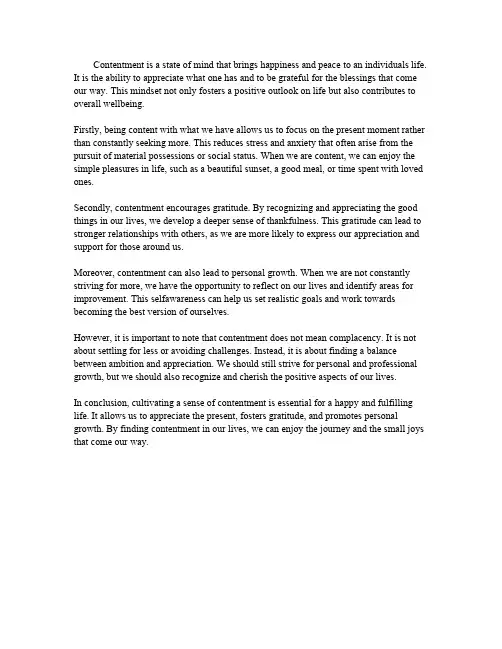
Contentment is a state of mind that brings happiness and peace to an individuals life. It is the ability to appreciate what one has and to be grateful for the blessings that come our way.This mindset not only fosters a positive outlook on life but also contributes to overall wellbeing.Firstly,being content with what we have allows us to focus on the present moment rather than constantly seeking more.This reduces stress and anxiety that often arise from the pursuit of material possessions or social status.When we are content,we can enjoy the simple pleasures in life,such as a beautiful sunset,a good meal,or time spent with loved ones.Secondly,contentment encourages gratitude.By recognizing and appreciating the good things in our lives,we develop a deeper sense of thankfulness.This gratitude can lead to stronger relationships with others,as we are more likely to express our appreciation and support for those around us.Moreover,contentment can also lead to personal growth.When we are not constantly striving for more,we have the opportunity to reflect on our lives and identify areas for improvement.This selfawareness can help us set realistic goals and work towards becoming the best version of ourselves.However,it is important to note that contentment does not mean complacency.It is not about settling for less or avoiding challenges.Instead,it is about finding a balance between ambition and appreciation.We should still strive for personal and professional growth,but we should also recognize and cherish the positive aspects of our lives.In conclusion,cultivating a sense of contentment is essential for a happy and fulfilling life.It allows us to appreciate the present,fosters gratitude,and promotes personal growth.By finding contentment in our lives,we can enjoy the journey and the small joys that come our way.。

Contentment is a virtue that has been extolled by philosophers and thinkers throughout history.It is a state of mind where one finds happiness and peace in the present,without the constant desire for more.This essay will delve into the importance of contentment and how it contributes to a more fulfilling life.Firstly,contentment fosters a sense of inner peace.When individuals are content with what they have,they experience less stress and anxiety about the future.This tranquility allows them to enjoy the present moment and appreciate the simple joys of life.For example,a person who is content with their job will find satisfaction in their daily tasks and derive happiness from their work,rather than constantly seeking a better position.Secondly,contentment promotes gratitude.Gratitude is the recognition and appreciation of the good things in life.When people are content,they are more likely to notice and be thankful for the blessings they have received.This gratitude can lead to a positive outlook on life and a stronger connection with others,as they are more likely to express their appreciation and share their good fortune.Thirdly,contentment encourages personal growth.When individuals are not constantly chasing after material possessions or social status,they have more time and energy to focus on selfimprovement.This can include pursuing hobbies,learning new skills,or engaging in activities that enrich their lives.For instance,a content person might choose to volunteer in their community,which not only benefits others but also contributes to their personal development.Moreover,contentment can lead to better relationships.When people are content with their own lives,they are less likely to be envious or competitive with others.This reduces the potential for conflict and allows for more harmonious interactions.In a content persons relationships,there is a greater focus on mutual support and understanding,rather than comparison and rivalry.Furthermore,contentment can contribute to better physical health.Studies have shown that stress and anxiety can have negative effects on the body,including increased risk of heart disease and a weakened immune system.By cultivating contentment,individuals can reduce these stressors and potentially improve their overall health.Lastly,contentment can lead to a more sustainable lifestyle.When people are content with what they have,they are less likely to engage in excessive consumption or wasteful practices.This can have a positive impact on the environment,as it reduces the demand for resources and decreases the amount of waste produced.In conclusion,contentment is a valuable state of mind that can lead to a more peaceful, grateful,and fulfilling life.By focusing on personal growth,fostering healthy relationships,and promoting a sustainable lifestyle,content individuals can experience the true essence of happiness and wellbeing.。
你同意知足常乐的观点吗英文作文I agree with the saying "contentment is the key to happiness" wholeheartedly. Contentment, also known as being satisfied or grateful for what we have, is essential for our overall well-being and happiness. In today's fast-paced world, where materialism and consumerism are on the rise, it is easy to get caught up in the pursuit of wealth, success, and status. However, true happiness doesn't come from external possessions or achievements but from within.When we learn to appreciate and be content with what we have, we experience a sense of peace and fulfillment that cannot be attained through material things. Contentment allows us to focus on the present moment, cherish the simple pleasures in life, and find joy in the little things. It helps us cultivate gratitude, resilience, and a positive outlook on life, which are crucial for mental and emotional well-being.Moreover, contentment promotes self-acceptance andself-love, as we learn to value ourselves for who we are rather than what we have or achieve. It enables us to let go of comparisons, envy, and the constant need for more, leading to a more meaningful and fulfilling life.In conclusion, embracing contentment is a powerful and transformative practice that can lead to greater happiness, peace, and fulfillment in life. By appreciating what we have, cultivating gratitude, and focusing on the present moment, we can find true joy and satisfaction in the simple things. Let us remember that true wealth lies not in material possessions but in a contented heart and a peaceful mind.。
英语作文:知足常乐 Be Happy With SatisfactionAs the saying goes, contentment is happiness. We should be content with what we have, and appreciate the little things in life.It's easy to get caught up in the pursuit of material wealth and fame. But those things don't guarantee happiness. Instead, it's important to appreciate what we already have. We should be grateful for our family, friends, and the opportunities we have. We should also take pleasure in the simple things, like a beautiful sunset or a delicious meal.We should also take time to relax and enjoy life. We can take a break from our busy schedules to do something we love. Whether it's going for a walk or playing a board game, taking a break can help us appreciate the little things in life.Finally, we should be content with our lives. We should accept our mistakes and learn from them. We should also be proud of our accomplishments and enjoy our successes.Being content with what we have is essential for a happy life. We should take pleasure in the small things and be grateful for our family and friends. We should also take time to relax and enjoy life. By doing so, we can be happy with satisfaction.。
知足常乐英文作文Satisfaction brings joy. It's the feeling of contentment and gratitude that makes life fulfilling. When we learn to appreciate what we have, we can find happiness in the simplest things. It's about being grateful for the present moment and not constantly seeking more.Being content doesn't mean we stop striving for better. It's about finding a balance between ambition and appreciation. We can still have goals and dreams, but we don't let them overshadow the joy of the present. It's the ability to be happy with what we have while working towards what we want.Gratitude is the key to satisfaction. When we focus on the positives in our lives, we can find happiness even in difficult times. It's about shifting our perspective and choosing to see the good. By practicing gratitude, we can cultivate a sense of contentment that brings joy to our lives.Comparing ourselves to others only leads to dissatisfaction. When we constantly measure our success and happiness against others, we lose sight of our own blessings. It's important to remember that everyone's journey is different, and we should focus on our own path rather than someone else's.Material possessions and external achievements don't guarantee happiness. True satisfaction comes from within, from a sense of peace and contentment that isn't dependent on external factors. It's about finding joy in the present moment and appreciating the little things that bring us happiness.In a world that's constantly pushing us to want more, learning to be content is a radical act of self-love. It's about embracing who we are and finding joy in the present. When we let go of the need for more and learn to be satisfied with what we have, we can experience a deeper sense of happiness and fulfillment.。
知足常乐作文模板英语英文回答:Contentment is a state of mind in which one issatisfied with what one has. It is often said that contentment is the key to happiness. When we are content, we are not constantly striving for more. We are able to appreciate what we have and to find joy in the simple things in life.There are many benefits to contentment. Content people are more likely to be happy and healthy. They are also more likely to have strong relationships and to be successful in their careers.If you want to be more content, there are a few things you can do. First, try to focus on the positive things in your life. Make a list of all the things you are grateful for. Second, set realistic goals for yourself. Don't try to be perfect. Just focus on making small improvements eachday. Third, spend time with people who make you happy. Surround yourself with positive people who will support you on your journey to contentment.Contentment is not always easy to achieve. There willbe times when you feel dissatisfied or unhappy. But if you keep working at it, you will eventually reach a place of contentment. And when you do, you will find that it isworth all the effort.中文回答:知足常乐是一种心态,一个人对自己的现状感到满足。
自得其乐知足常乐助人为乐英语作文全文共3篇示例,供读者参考篇1Finding True Happiness: Joy in Contentment, Helping Others, and Living SimplyAs a student, I often find myself caught up in the relentless pursuit of achievements, grades, and future success. The pressure to excel academically and secure a promising career can be overwhelming, leading many of us to neglect the simpler joys in life. However, through my personal experiences and observations, I have come to realize that true happiness lies not in the constant chase for more, but in finding contentment, helping others, and embracing a simpler way of living.The Joy of ContentmentIn a world that constantly bombards us with messages of dissatisfaction and the need for more, cultivating a sense of contentment can be a true challenge. We are conditioned to believe that happiness is found in material possessions, social status, or personal accomplishments. However, I have learnedthat true contentment arises from within, from appreciating what we already have and finding joy in the present moment.During my time as a volunteer at a local shelter, I encountered individuals who had lost everything – their homes, their belongings, and in some cases, even their families. Yet, amidst their struggles, I witnessed an unwavering resilience and a genuine appreciation for the smallest of blessings. It was humbling to see how they found solace in the simplest of things – a warm meal, a kind word, or a safe place to sleep.This experience taught me that true contentment is not determined by external circumstances, but by our ability to find gratitude in what we have, no matter how little it may seem. When we shift our focus from what we lack to what we have, we open ourselves up to a profound sense of joy and inner peace.The Joy of Helping OthersAnother source of happiness that I have discovered is the act of helping others. In our individualistic society, it's easy to become consumed by our own desires and overlook the needs of those around us. However, when we extend a helping hand and contribute to the well-being of others, we tap into a deep sense of purpose and fulfillment that transcends personal gain.During my time as a tutor at a local community center, I had the opportunity to work with underprivileged children who faced numerous challenges in their pursuit of education. As I witnessed their determination and eagerness to learn, I found myself deeply moved and inspired. The simple act of sharing my knowledge and offering guidance brought me immense joy, knowing that I was making a positive impact on their lives.Helping others not only enriches the lives of those we serve but also nourishes our own souls. It cultivates empathy, compassion, and a sense of interconnectedness that reminds us of our shared humanity. When we give selflessly, we experience a profound sense of joy that cannot be attained through material possessions or personal accomplishments alone.The Joy of Living SimplyIn our constantly evolving and fast-paced world, it's easy to get caught up in the pursuit of more – more possessions, more experiences, more achievements. However, I have come to realize that true happiness often lies in embracing a simpler way of living, one that is rooted in mindfulness, appreciation, and a focus on what truly matters.During a recent camping trip with friends, I experienced firsthand the beauty and serenity of disconnecting from theconstant stimulation of modern life. Surrounded by nature's embrace, I found myself present in the moment, appreciating the simple pleasures of a crackling campfire, starry skies, and genuine conversations with loved ones.This experience reminded me that true joy can be found in the simplest of things – a good book, a heartfelt conversation, or a quiet moment of reflection. By decluttering our lives and letting go of the incessant pursuit of more, we create space for what truly matters – meaningful connections, personal growth, and a deeper appreciation for the present moment.Embracing a simpler way of living also aligns with a more sustainable and mindful approach to life. By minimizing our consumption and being intentional about our choices, we not only reduce our environmental impact but also cultivate a greater sense of gratitude and appreciation for what we have.ConclusionIn a world that often equates happiness with external achievements and material possessions, it's easy to lose sight of the true sources of joy. However, through my experiences, I have come to understand that true happiness lies in finding contentment within ourselves, helping others, and embracing a simpler way of living.By cultivating gratitude for what we have, extending a helping hand to those in need, and decluttering our lives from the篇2Finding True Happiness in a Busy WorldAs students, our lives are often a whirlwind of classes, homework, extracurriculars, and the pressure to succeed. In the midst of this chaos, it can be easy to lose sight of what truly brings happiness and fulfillment. The pursuit of fleeting pleasures like material possessions or social status often leaves us feeling empty and unsatisfied. However, I have found that embracing the principles of contentment, helping others, and being content can lead to a deeper, more lasting sense of joy.The Path to ContentmentContentment is the state of being satisfied with what one has, without constantly striving for more. In our consumer-driven society, where advertisements bombard us with messages about the latest gadgets, fashion trends, and luxuries we "must" have, cultivating contentment can be a challenge. We are conditioned to believe that happiness lies in acquiring more possessions, achieving higher status, or accumulating wealth.However, as I have learned through personal experience and observation, true contentment comes from within. It is the ability to find joy in the simple pleasures of life, such as spending quality time with loved ones, appreciating nature's beauty, or engaging in hobbies that bring us fulfillment. When we free ourselves from the relentless pursuit of material possessions and external validation, we open ourselves up to a richer, more meaningful existence.One of the keys to achieving contentment is practicing gratitude. By consciously acknowledging and appreciating the good things in our lives, no matter how small or seemingly insignificant, we shift our focus away from what we lack and towards what we already have. This mindset not only increases our overall satisfaction with life but also fosters a sense of resilience in the face of challenges and setbacks.The Joy of Helping OthersClosely tied to the concept of contentment is the idea of finding joy in helping others. When we step outside of our own self-absorbed bubbles and extend a helping hand to those in need, we tap into a profound source of fulfillment that transcends material possessions or personal achievements.Engaging in acts of kindness and service, whether through volunteering, donating to charitable causes, or simply offering support and encouragement to those around us, has a remarkable ability to enrich our lives. Not only does it positively impact the lives of others, but it also cultivates a sense of purpose, connection, and gratitude within ourselves.Throughout my academic journey, I have had the privilege of participating in various community service initiatives, from serving meals at a local soup kitchen to tutoring underprivileged children. Each experience has left an indelible mark on my soul, reminding me of the inherent goodness in humanity and the power of compassion to transcend boundaries and create positive change.Moreover, research has consistently shown that helping others can have profound psychological and physiological benefits. Acts of kindness and generosity have been linked to increased happiness, reduced stress levels, and even improved physical health. By shifting our focus outward and contributing to the greater good, we tap into a wellspring of joy that cannot be found in material pursuits alone.Being Content: Embracing the Present MomentFinally, the art of being content – of fully embracing and appreciating the present moment – is essential to achieving true happiness. In our fast-paced, achievement-oriented society, it is all too easy to become consumed by the pursuit of future goals or the regrets of the past. We often find ourselves sacrificing the joy of the present moment in the name of some distant, elusive sense of satisfaction.However, true contentment lies in the ability to be fully present, to savor the beauty and richness of each passing moment. Whether it's the warmth of the sun on our face, the laughter of a child, or the simple act of breathing, there is profound joy to be found in the here and now.Mindfulness practices, such as meditation and conscious breathing exercises, can be invaluable tools in cultivating this state of present-moment awareness. By quieting the incessant chatter of our minds and anchoring ourselves in the sensations of the present, we open ourselves up to a deeper appreciation of life's simple pleasures.Moreover, embracing the present moment allows us to let go of the relentless pursuit of perfection and the constant striving for some idealized version of ourselves or our lives. When we accept ourselves and our circumstances as they are,without judgment or resistance, we cultivate a sense of inner peace and contentment that cannot be shaken by external circumstances.The Road AheadAs I prepare to embark on the next chapter of my life, whether it be further education, a career, or some other endeavor, I carry with me the invaluable lessons of contentment, helping others, and being content. These principles have not only enriched my academic journey but have also provided a solid foundation for a life of true happiness and fulfillment.In a world that often equates success with material wealth and outward achievements, I am reminded that true joy lies in the simple things – the warmth of human connections, the ability to make a positive impact on others, and the capacity to find beauty and wonder in the present moment.It is my sincere hope that these values will continue to guide me as I navigate the challenges and opportunities that lie ahead. And perhaps, by embracing these principles and sharing them with others, I can contribute to a ripple effect of joy and contentment that extends far beyond my own life.For in the end, happiness is not a destination to be reached or a prize to be claimed, but a way of being – a state of mind that blossoms when we cultivate gratitude, compassion, and a deep appreciation for the beauty and richness of the present moment.篇3A Joyful Life of Contentment and Giving BackAs a student, life can often feel like a constant juggling act. We have academic pressures, extracurricular commitments, social lives to maintain, and for many, part-time jobs. Amidst all these competing priorities, it's easy to lose sight of what truly matters - our own happiness and wellbeing. However, I've come to realize that cultivating contentment from within and finding fulfillment in assisting others are vital keys to leading a joyful existence.To begin, let me first discuss the notion of "self-obtained joy" or finding happiness independently, without relying on external sources. From an early age, we're conditioned to believe that possessions, status, and the approval of others are gateways to satisfaction. We diligently check off boxes - getting good grades, securing a prestigious internship, purchasing the latestgadgets. Yet, even after achieving these superficial milestones, a lingering sense of emptiness persists.The reason for this, I've realized, is that true joy stems from within. It blossoms when we pursue endeavors aligned with our values and nurture relationships that uplift us. Over the years,I've consciously focused on engaging in activities that rejuvenate my spirit - journaling, immersing myself in nature, practicing meditation, and losing myself in a captivating book. These simple acts help me reconnect with my authentic self, independent of others' expectations or societal pressures.Furthermore, I've learned to appreciate the metaphorical "journey" rather than obsessing over the destination. Each challenging assignment, rigorous exam, or arduous project is an opportunity for growth. I find satisfaction in giving my full effort, constantly striving to better myself. The intrinsic drive to excel, not external rewards or recognition, fuels my motivation. This mindset has not only enriched my academic experience but also instilled a deeper sense of purpose.Simultaneously, I've discovered that lasting contentment often arises from cultivating an "attitude of gratitude." Instead of fixating on what I lack, I make a conscious effort to appreciate the abundance in my life - supportive friends, dedicated mentors,access to quality education, and a loving family. This perspective helps me navigate setbacks with resilience and maintains my inner peace during turbulent times.Admittedly, there are moments when self-doubt creeps in, and I find myself succumbing to societal pressures or comparisons. However, I've learned to gently reorient myself, grounding my sense of worth in my values, strengths, and efforts rather than superficial metrics. This self-compassion allows me to persist through obstacles with renewed determination.While finding joy within oneself is crucial, true fulfillment also blossoms when we extend ourselves to others. Helping those around us, whether through small acts of kindness or larger philanthropic endeavors, fills our lives with profound meaning and purpose. It is a source of "giver's glow" - that indescribable warmth we experience when positively impacting someone else's life.During my time in college, I've actively sought opportunities to give back to my community. One particularly rewarding experience was volunteering at a local elementary school's after-school program. Every week, I assisted children with their homework, played educational games, and served as a mentor. Witnessing their faces light up with understanding or hearingtheir infectious laughter brought me immense joy. These interactions reminded me that the simplest gestures can significantly impact someone's day and potentially alter their life's trajectory.Another way I've embraced the "helper's high" is through peer tutoring and mentoring. As a student ambassador, I guide prospective students through the admissions process, sharing insights from my own journey. I also volunteer as a writing tutor, helping my peers refine their essays and research papers. This role has not only allowed me to hone my communication and teaching abilities but has also been immensely gratifying, knowing that I've played a small part in someone else's academic success.Beyond these structured programs, I try to incorporate kindness into my daily life through simple acts - holding the door for others, offering a warm smile to someone who seems overwhelmed, or extending a listening ear to a friend in need. These seemingly insignificant gestures contribute to fostering a more compassionate and uplifting campus culture, one interaction at a time.Undoubtedly, there have been occasions when I've felt stretched thin, struggling to balance my commitments. However,I've learned that helping others, far from draining my energy, paradoxically replenishes it. There's something deeply nourishing about momentarily shifting our focus outward, away from our personal stresses and insecurities. It provides amuch-needed perspective, reminding us of our interconnectedness and collective humanity.Moreover, practicing empathy and compassion has strengthened my emotional intelligence and interpersonal skills, assets that will prove invaluable in any future career path I pursue. It has taught me to approach challenges and disagreements with nuance, considering diverse viewpoints before reaching conclusions. This ability to see issues through multiple lenses is a superpower in an increasingly polarized world.In summary, my journey thus far has reinforced two profound truths: Finding contentment within oneself is liberating, while bringing joy to others is ultimately what lends our lives deeper significance. We cannot control every circumstance that life presents, but we can control our mindset and how we choose to spend our finite time and energy.As I prepare to transition into the next phase of my life, I carry these lessons with me. I will continue nurturing my innerwellbeing through practices that ground me while simultaneously seeking opportunities to positively impact those around me, one act of compassion at a time. For in the words of the Dalai Lama, "Happiness is not something ready-made. It comes from your own actions." By focusing inward and outward, we can pave our unique paths to profound, sustainable joy and leave the world a little bit brighter.。
“Contentment: The Key to Happiness”In a world that constantly urges us to strive for more, contentment stands as a beacon of inner peace and fulfillment. Rooted in gratitude and acceptance, contentment is the antidote to the insatiable pursuit of material wealth and external validation, offering a pathway to true happiness and fulfillment.At its essence, contentment is a state of mind characterized by a deep sense of satisfaction and appreciation for what we have, rather than longing for what we lack. It is the recognition that true abundance lies not in the accumulation of possessions or achievements, but in the richness of our relationships, the beauty of nature, and the simple joys of everyday life.In a culture that often equates success with wealth, power, and status, cultivating a spirit of contentment can be a radical act of self-care and resistance. It is a conscious choice to reject the constant pressure to keep up with the Joneses and instead, to find contentment in the present moment, exactly as it is.Moreover, contentment is not passive resignation, but rather an active engagement with life. It is the willingness to embrace life’s imperfections and uncertainties with grace and humility, knowing that true happiness does not depend on external circumstances, but on our internal state of being. Practicing contentment requires cultivating a mindset of abundance rather than scarcity, focusing on what we have rather than what we lack. It means savouring life’s simple pleasures – a warm cup of tea, a heartfelt conversation, a stroll in the park – and finding joy in the ordinary moments that often go unnoticed.But perhaps most importantly, contentment is a practice of self-love and self-compassion. It is about treating ourselves with kindness and gentleness, and recognizing that we are enough, just as we are. It is about letting go of the need for external validation and finding validation from within.In a world that often measures success in terms of material wealth and external achievements, contentment serves as a powerful reminder that true happiness lies not in what we have, but in who we are and how we choose to live our lives. So let us cultivate a spirit of contentment, and discover the profound joy and fulfillment that comes from living a life of gratitude, acceptance, and inner peace.。
知足常乐英语演讲稿
Happiness Lies in Contentment
He who is in constant pursuit of happiness will never find it because happiness is not
something tangible that one can easily grab but rather a state of mind. True happiness lies in contentment. Here are some tips for us to always be happy.
First, we should be content with who we are. We don't have to compare ourselves with others or try to be someone else. By simply being ourselves, we'll be happy. Second, we
need to be satisfied with what we have. It's enough for us to be happy. We should value the si-mp-ler things like our health and freedom. Having more won't necessarily bring more happiness, because real happiness is satisfaction from within. Third, we have to be content with the present. We can enjoy life and its many precious moments and experience each day to the fullest. Fourth, we must realize happiness is a choice. We decide if we want to be happy. We determine our level of contentment. Happiness depends not on position but on disposition. We can choose to be happy, satisfied and content.
In conclusion, we must always remember happiness liesin contentment. We should be grateful for what we have, behappy and satisfied with our lives.
知足常乐
一直在追求快乐的人,是永远无法找到快乐的,因为快乐并不是实质的、可以容易得到的东西,而是一种心态。
真正的快乐在於知足。
以下就是一些诀窍,让我们永远保持快乐。
首先,我们应该对自己个人感到满足。
我们不必和他人比较,或想做别人,只要做我们自己,就会感到快乐了。
第二,我们必须对我
们所有的一切感到满意。
这些就足够我们快乐了。
我们应该要珍惜更简单的事情,像是我们的健康和自由等。
拥有更多未必会更快乐,因为真正的快乐是一种发自内心的满足。
第三,我们必须对现在要知足。
我们可以享受生命以及生命中珍贵的时刻,充分体验每一天。
第四,我们必须了解,快乐是一种选择。
我们决定自己是否要快乐,我们决定自己满足的程度。
快乐不是取决於地位,而是取决於性情。
我们可以选择过得快乐、知足。
总之,我们一定要记得知足常乐。
我们应该对我们所拥有的'一切心存感激,对我们的生活感到满足、满意。
知足常乐英语演讲稿 [篇2]
once people were asked if they felt happy, most people did not know how to answer, to their hesitation, they were not satisfied with their situation. today, people are under great pressure, they live in a fast-paced way. they have worked so hard to satisfy their meets, but what they want is far out of their reach, so they feel tired and not happy. happiness could be an easy thing, only if people are easy to be satisfied, they can be happy for having a vacation and having dinner with their parents, these things are easy to be ignored. when people are ambitious, they want more, they don’t realize what they have is more than o ther people, other people want to be one of them. so when you feel unhappy, why don’t you look at the things you have, you will realize you are a happy man.
知足常乐英语演讲稿 [篇3]
once people were asked if they felt happy, most people did not know how to answer, to their hesitation, they were not satisfied with their situation. today, people are under great pressure, they live in a fast-paced way. they have worked so hard to satisfy their meets, but what they want is far out of their reach, so they feel tired and not happy. happiness could be an easy thing, only if people are easy to be satisfied, they can be happy
for having a vacation and having dinner with their parents, these things are easy to be ignored. when people are ambitious, they want more, they don’t re alize what they have is more than other people, other people want to be one of them. so when you feel unhappy, why don’t you look at the things you have, you will realize you are a happy man.
曾经人们被询问你幸福吗,大部分人不知道如何回答,他们的犹豫,意味着他们对自己的现状不满意。
今天,人们面临很大的压力,他们生活是快节奏的。
他们很努力工作,以此来满足他们的需求,但是他们想要远远未能达到,因此他们感到累和不幸福。
幸福可以是一件很简单的事,只要人们容易满足,他们可以为拥有一个假期和与家人吃饭而感到幸福,这些事情是很容易忽略的。
当人们充满雄心壮志时,他们想要很多,没有意识到自己拥有的比别人多很多,别人想要成为他们中的一员。
所以当你感到不幸福时,为什么不看看你拥有的东西,这样你就会意识到自己是个幸福的人。
【知足常乐英语演讲稿】。